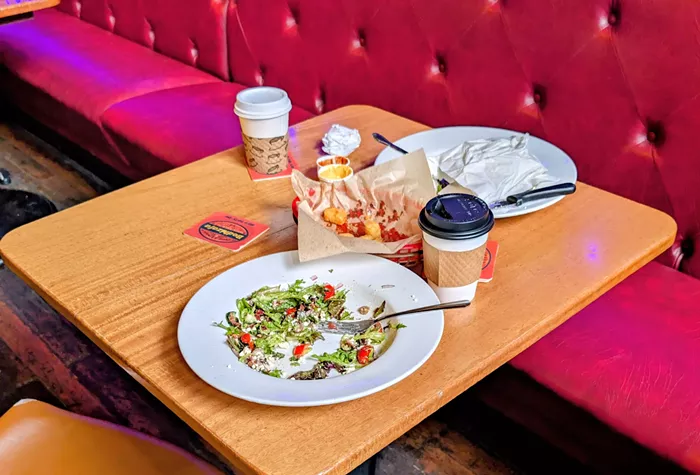I very well know there are other more pressing things to talk about, so forgive me this digression. As soon as I’m done, you can resume watching today’s episode of As World the Burns.
So, let me begin with something that happened to me about a month ago at Peterson Bros. 1111, a Tacoma pub that the pop-rock band Encumclaw highly recommends. After completing a sandwich called The Brutus (deli meat, thick and grilled), I noticed something odd in the corner of my eye. On the table next to the one I shared with my partner sat three women who were clearly old friends (all were in their early 60s; all in clothes that make the transition from the middle years to the autumn ones comfortable); two were sharing gossip about someone who recently returned to the City of Destiny after a mysterious five-year absence; one was silent and staring at me.
I looked around me to see if something was the matter, but nothing was amiss. My zipper was up. I wasn’t bleeding. Nothing seedy on my phone’s screen. But her eyes remained glued on me. And I kept wondering if something very bad had or was about to happen to me. Then she cracked, leaned toward my table, and said: “I hope you do not mind me asking, but are you going to eat that pickle on your plate?”
I noticed the speared pickle for the first time. It sat at the edge of my plate with a view of its crumbs and the bits of meat that escaped The Brutus. I had no plan to eat it, and so happily offered it to her. And she beamed with joy as she claimed and devoured it. A moment later, her attention was focused on the gossip: Where did that person go? Does anyone know?
While returning to Seattle, I gave what happened at the Peterson Bros. 1111 some thought: Why was it so hard for the stranger to ask for my pickle? Because, in a restaurant, the convention (if not the rule) is to throw what remains on your plate into the trash (even if it’s a heap of untouched fries). You paid for it, you own it, and you are only permitted to do one of two things with it: eat or have the food tossed into a bin. There’s also the idea that eating what’s left on a stranger’s plate is unbecoming and even disgusting. What if the stranger is sick, or has not washed their hands. Do you want to eat all of those unknowns? Better to play it safe and buy your own pickle.
But on close examination we find that the convention (“it’s yours!”) often leads to waste that’s characteristic of an economic system that’s destroying the very environment that made human life possible. As for the yuck factor, no one questions or is revolted by the convention of sharing leftover food with family members or friends. Also we make out with strangers all of the time. Recall this erotic passage from James Joyce’s Ulysses: “Ravished over her I lay, full lips full open, kissed her mouth. Yum. Softly she gave me in my mouth the seedcake warm and chewed. Mawkish pulp her mouth had mumbled sweet and sour with spittle. Joy: I ate it: joy.” Something like this happened to many of you last Friday night, and there was nothing yucky about it.
Now let’s jump forward to Friday, October 26. After a quick drink, I’m walking out of the cosy Stars Brass Works Lounge (great basic burgers, great mix of music, great bartenders) in Georgetown. Near the door, however, something catches the corner of my eye: a few abandoned tater tots in a red checkered basket liner. My instinct is to grab one or two and pop them into my mouth. But I can’t. I lack the will to break the convention. I’ll look like a madman to anyone who catches me in the act. What’s wrong with that guy? Does he also pick up and smoke discarded cigarette butts? I leave the lounge with a sense of embarrassment—maybe someone noticed my hesitation and determined exactly what was on my mind.
But if you give it some thought, it will not be that hard to imagine a restaurant that breaks with this irrational convention by simply stating, on its menu, that along with what one orders, one is free to eat what’s left on another person’s plate—or to offer what’s left on yours to someone else. But such an establishment, as reasonable as it might be, is likely never to leave that continuously frustrated region of our dreams called Utopia.
Now back to the news of a world that can only be described as dystopian.




